
In summer 2023, three students received an RGK Global Fellowship to support their internship working with an NGO outside of the U.S. Read more about each of our fellowship recipients and their summer internship experiences below.
The RGK Global Fellowships provide financial assistance to graduate students at The University of Texas at Austin who choose to pursue an international internship placement with an NGO or nonprofit outside of the U.S. The award provides up to $5,000 to help defray living and travel costs associated with international internship opportunities. Learn more about summer 2024 fellowship opportunities and our other global programs.
Gabriela LeBaron, MGPS student at the LBJ School
Organization: Réseau des Femmes Leaders pour le Développement (RFLD) (Network of Women Leaders for Development)
Location: Benin, Africa
Gabriela LeBaron spent her summer in Benin, Africa working with Réseau des Femmes Leaders pour le Développement (RFLD), an intermediary grant-making and capacity-building NGO that supports grassroots human rights organizations across 27 countries. Started in Benin over a decade ago, RFLD provides funding, guidance, and long-term support to grassroots organizations working in peace and human rights.
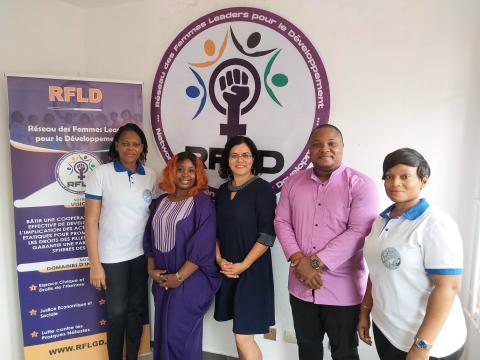
"A big part of what I’m learning is that local organizations and local people are going to lead the way on solutions,” LeBaron said.
An MGPS student at the LBJ School, LeBaron’s area of interest is Development, Peace, and Security, with a focus on West African areas and DR Congo. She learned about RFLD while conducting research on feminist organizations for her French class and reached out to the president to ask how she could support the organization through an internship.
For much of the summer, RFLD president Dossi Sekonnou Gloria Agueh hosted LeBaron in her guest house, which allowed LeBaron to learn more about the organization and Benin’s culture.
“From morning to evening, I was in deep cultural immersion,” LeBaron said. "You have to be here on the ground to see people and feel their energy. That’s when the questions come up and you start to understand and learn.”
“You can read as many scientific papers as you want, but there is no way you’re going to understand what it really is like,” she said.
LeBaron worked with the RFLD team to pivot their communications strategy and demonstrate their impact through storytelling on their website. She recognized that while the organization was doing impactful work through their grantees, these stories were not reflected on their website. Because of this, RFLD could be missing out on important donations, large and small.
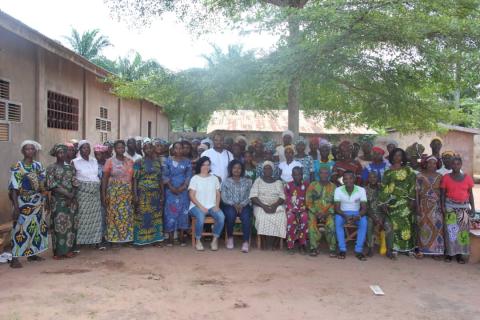
“My experience helped me to better understand how the U.S. government and private citizens can truly help people in Benin and maybe other countries in West Africa,” LeBaron said. “The prevention of the spread of conflict will depend on providing adequate support to local and homegrown organizations such as RFLD.”
Katrina Liebsch, MGPS student at the LBJ School
Organization: Mossawa Center, The Advocacy Center for Arab Citizens in Israel
Location: Haifa, Israel
Katrina Liebsch spent nine weeks working with the Mossawa Center, an advocacy center for Palestinian citizens of Israel. The Mossawa team, consisting of five full-time staff and five interns, works on everything from international policy and advocacy to grassroots youth programming. Liebsch’s internship consisted of several parts: international advocacy, PR and communications, economic budget analysis , and implementing a project management tool.
As part of her role, Liebsch put together briefings to prepare Mossawa’s leadership to meet with members of the UN Humans Rights Council and for their EU Delegation to Brussels. She worked closely with leadership, assisting with international advocacy efforts for western audiences.
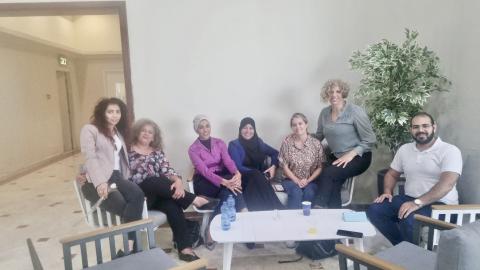
“That was really invaluable experience for me, preparing for meetings like that,” said Liebsch, who is fluent in Arabic. “You're not just translating work; you're learning to navigate language differences with different audiences and how they perceive certain words.”
Though she learned a lot on the job, Liebsch felt that many of her courses at the LBJ School helped prepare her for the reality of working with an international NGO.
“The day I arrived, I learned we had delegates leaving to meet with members of the EU the next day and they needed pamphlets written in English,” Liebsch said. “Professor Pope’s class helped prepare me to write quickly and concisely, and I feel I’ve gotten a lot better at that.”
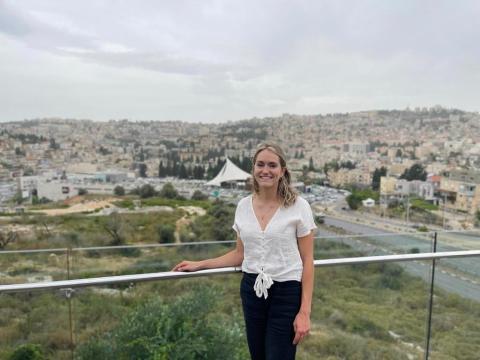
Liebsch also got to utilize data skills she developed at the LBJ School to support Mossawa’s advocacy efforts to promote equality in the Israeli State budget. She supported economists on the team in analyzing state budget funds being designated for Palestinian Israeli and Jewish Israeli localities. She developed data visualizations and translated their findings into English for the U.S. Embassy and other entities.
Mossawa often organized team volunteer opportunities to engage with other NGOs in their community. One weekend, Liebsch and other members of the team travelled to the Negev Desert to meet with a women's association that offers free youth mental health services. Through this trip, Liebsch and the team learned more about the association’s work and were able to secure funding for them.
“There were some days where it was really tough, as would be expected,” Liebsch said, reflecting on her summer internship experience. “But you grow and the experience helps give you a leg up in the future to face similar challenges.”
Liebsch previously traveled to Israel with Dr. David Eaton as part of his fall 2022 course, “Civil Society Activities in Israel and Palestine,” a course co-taught with Hebrew University. Having this understanding of the NGO network in Israel and information about how organizations are funded was helpful context for her summer internship with Mossawa.
“Being in person, you get context that you’re not going to get working remote,” Liebsch said. “You’re closer to what’s happening on the ground.. Hearing from and working with people who have been working and living in the space for decades is really valuable.”
Sharon V. Munroe, MBA, MPH, CHW at the UTHealth Houston School of Public Health
Organization: Maya Midwifery International
Location: Quetzaltenango, Guatemala
Sharon Munroe, a doctoral student at the UTHealth Houston School of Public Health’s Austin campus, traveled to Guatemala this summer to study the work of Indigenous Maya midwives in maternal healthcare. She spent two weeks in Concepción Chiquirichapa to study the work of indigenous Mayan midwives (Comadronas) working in collaboration with sponsor Maya Midwifery International.
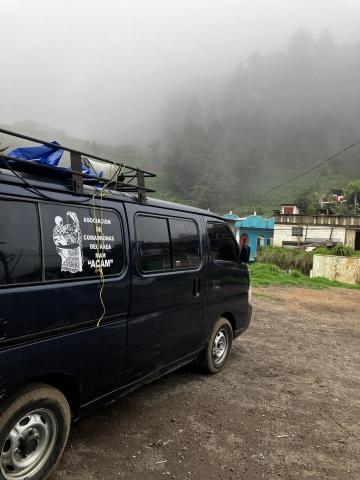
During her time in Guatemala, Munroe lived above a 24-hour birthing center run by the Association of Midwives of the Mam Speaking Area (ACAM), observing their work delivering babies and caring for new mothers and newborns. She shared meals with the midwives in the center’s kitchen and spent time with new mothers and their families during and after their births.
“It was an amazing, immersive experience,” Munroe said. “Everyone was so kind and generous, sharing their time and stories about their calling to work as Comadronas.”
Munroe conducted interviews with ten of the midwives and the center’s affiliated doctor to learn more about their practice, training, experiences, and career goals. Before her trip, Munroe developed these qualitative research materials with the support of Dr. Courtney Byrd-Williams, assistant professor at UTHealth.
In addition to delivering babies at their clinic, the team of 12 midwives of ACAM set up mobile clinics in rural areas of Quetzaltenango each month to provide pre-and post-natal care to hundreds of new mothers, as well as the hands-on training of local community midwives. Munroe accompanied the midwives on these trips, learning more about the culture of maternal healthcare and the hospital system in these regions. People she spoke with on these trips often shared with Munroe their distrust of the Guatemalan hospital system and a preference to seek care from medical providers within their culture and ancestral practices.
“The Indigenous Maya population has extreme comfort and lower stress levels in encounters with these healthcare providers based on cultural and linguistic ties with families in their area,” Munroe shared in a policy brief at the end of her internship. “Thousands of healthy pregnancies and low-cost, safe childbirths can be attributed to ACAM over 19 years.”
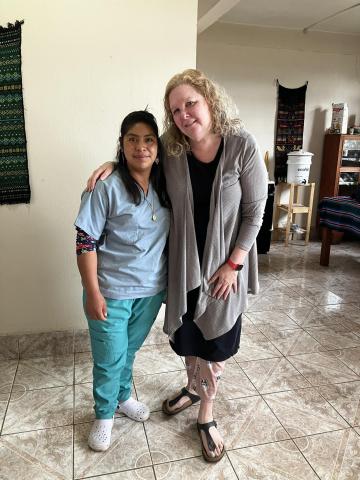
After returning to the U.S., Munroe wrote a policy brief advocating for improved pay and more recognition for Indigenous Maya midwives’ work, when was then translated and sent to Guatemala’s Ministry of Health. In the brief, Munroe recommended that, “to achieve its long-term health and development goals, Guatemala must transform how health services are delivered, financed, and monitored,” and that the Ministry of Health should be collaborating with and financially supporting the trusted and well-trained Comadronas to continue providing high-quality maternal and infant care in Guatemala’s rural communities.
Munroe plans to continue studying peer healthcare professionals' work, including midwives and Community Health Workers, as part of her second year in the DrPH program in Health Promotion, Health Education, and Community Health Practice.

